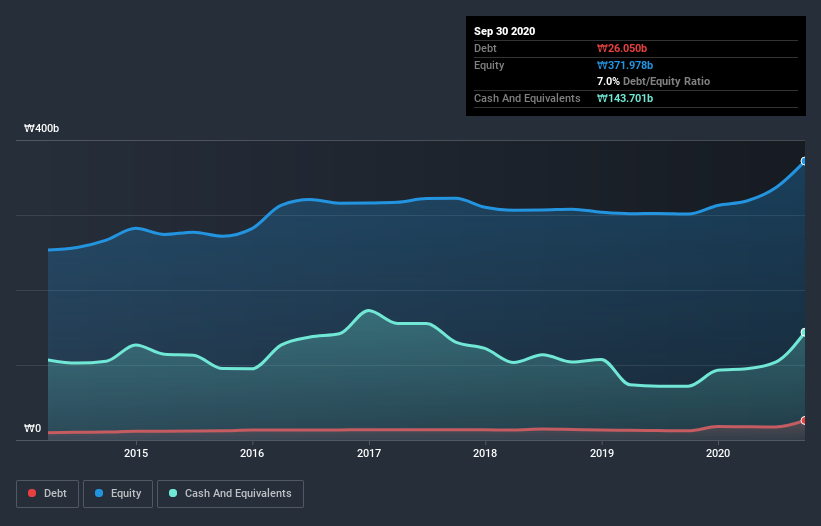- South Korea
- /
- Chemicals
- /
- KOSE:A017960
These 4 Measures Indicate That Hankuk Carbon (KRX:017960) Is Using Debt Safely
David Iben put it well when he said, 'Volatility is not a risk we care about. What we care about is avoiding the permanent loss of capital.' It's only natural to consider a company's balance sheet when you examine how risky it is, since debt is often involved when a business collapses. Importantly, Hankuk Carbon Co., Ltd. (KRX:017960) does carry debt. But the real question is whether this debt is making the company risky.
What Risk Does Debt Bring?
Generally speaking, debt only becomes a real problem when a company can't easily pay it off, either by raising capital or with its own cash flow. Part and parcel of capitalism is the process of 'creative destruction' where failed businesses are mercilessly liquidated by their bankers. However, a more common (but still painful) scenario is that it has to raise new equity capital at a low price, thus permanently diluting shareholders. Of course, debt can be an important tool in businesses, particularly capital heavy businesses. When we examine debt levels, we first consider both cash and debt levels, together.
View our latest analysis for Hankuk Carbon
How Much Debt Does Hankuk Carbon Carry?
You can click the graphic below for the historical numbers, but it shows that as of September 2020 Hankuk Carbon had ₩26.0b of debt, an increase on ₩12.3b, over one year. However, it does have ₩143.7b in cash offsetting this, leading to net cash of ₩117.7b.

A Look At Hankuk Carbon's Liabilities
Zooming in on the latest balance sheet data, we can see that Hankuk Carbon had liabilities of ₩75.4b due within 12 months and liabilities of ₩26.8b due beyond that. Offsetting this, it had ₩143.7b in cash and ₩28.6b in receivables that were due within 12 months. So it actually has ₩70.1b more liquid assets than total liabilities.
This short term liquidity is a sign that Hankuk Carbon could probably pay off its debt with ease, as its balance sheet is far from stretched. Simply put, the fact that Hankuk Carbon has more cash than debt is arguably a good indication that it can manage its debt safely.
Even more impressive was the fact that Hankuk Carbon grew its EBIT by 533% over twelve months. That boost will make it even easier to pay down debt going forward. When analysing debt levels, the balance sheet is the obvious place to start. But it is future earnings, more than anything, that will determine Hankuk Carbon's ability to maintain a healthy balance sheet going forward. So if you want to see what the professionals think, you might find this free report on analyst profit forecasts to be interesting.
Finally, a business needs free cash flow to pay off debt; accounting profits just don't cut it. While Hankuk Carbon has net cash on its balance sheet, it's still worth taking a look at its ability to convert earnings before interest and tax (EBIT) to free cash flow, to help us understand how quickly it is building (or eroding) that cash balance. In the last two years, Hankuk Carbon's free cash flow amounted to 32% of its EBIT, less than we'd expect. That's not great, when it comes to paying down debt.
Summing up
While it is always sensible to investigate a company's debt, in this case Hankuk Carbon has ₩117.7b in net cash and a decent-looking balance sheet. And we liked the look of last year's 533% year-on-year EBIT growth. So we don't think Hankuk Carbon's use of debt is risky. There's no doubt that we learn most about debt from the balance sheet. However, not all investment risk resides within the balance sheet - far from it. For example, we've discovered 2 warning signs for Hankuk Carbon (1 is a bit concerning!) that you should be aware of before investing here.
Of course, if you're the type of investor who prefers buying stocks without the burden of debt, then don't hesitate to discover our exclusive list of net cash growth stocks, today.
When trading Hankuk Carbon or any other investment, use the platform considered by many to be the Professional's Gateway to the Worlds Market, Interactive Brokers. You get the lowest-cost* trading on stocks, options, futures, forex, bonds and funds worldwide from a single integrated account. Promoted
Valuation is complex, but we're here to simplify it.
Discover if Hankuk Carbon might be undervalued or overvalued with our detailed analysis, featuring fair value estimates, potential risks, dividends, insider trades, and its financial condition.
Access Free AnalysisThis article by Simply Wall St is general in nature. It does not constitute a recommendation to buy or sell any stock, and does not take account of your objectives, or your financial situation. We aim to bring you long-term focused analysis driven by fundamental data. Note that our analysis may not factor in the latest price-sensitive company announcements or qualitative material. Simply Wall St has no position in any stocks mentioned.
*Interactive Brokers Rated Lowest Cost Broker by StockBrokers.com Annual Online Review 2020
Have feedback on this article? Concerned about the content? Get in touch with us directly. Alternatively, email editorial-team (at) simplywallst.com.
About KOSE:A017960
Hankuk Carbon
Produces and sells carbon fiber, synthetic resin, and glass paper related products in South Korea.
Excellent balance sheet and fair value.
Market Insights
Community Narratives



